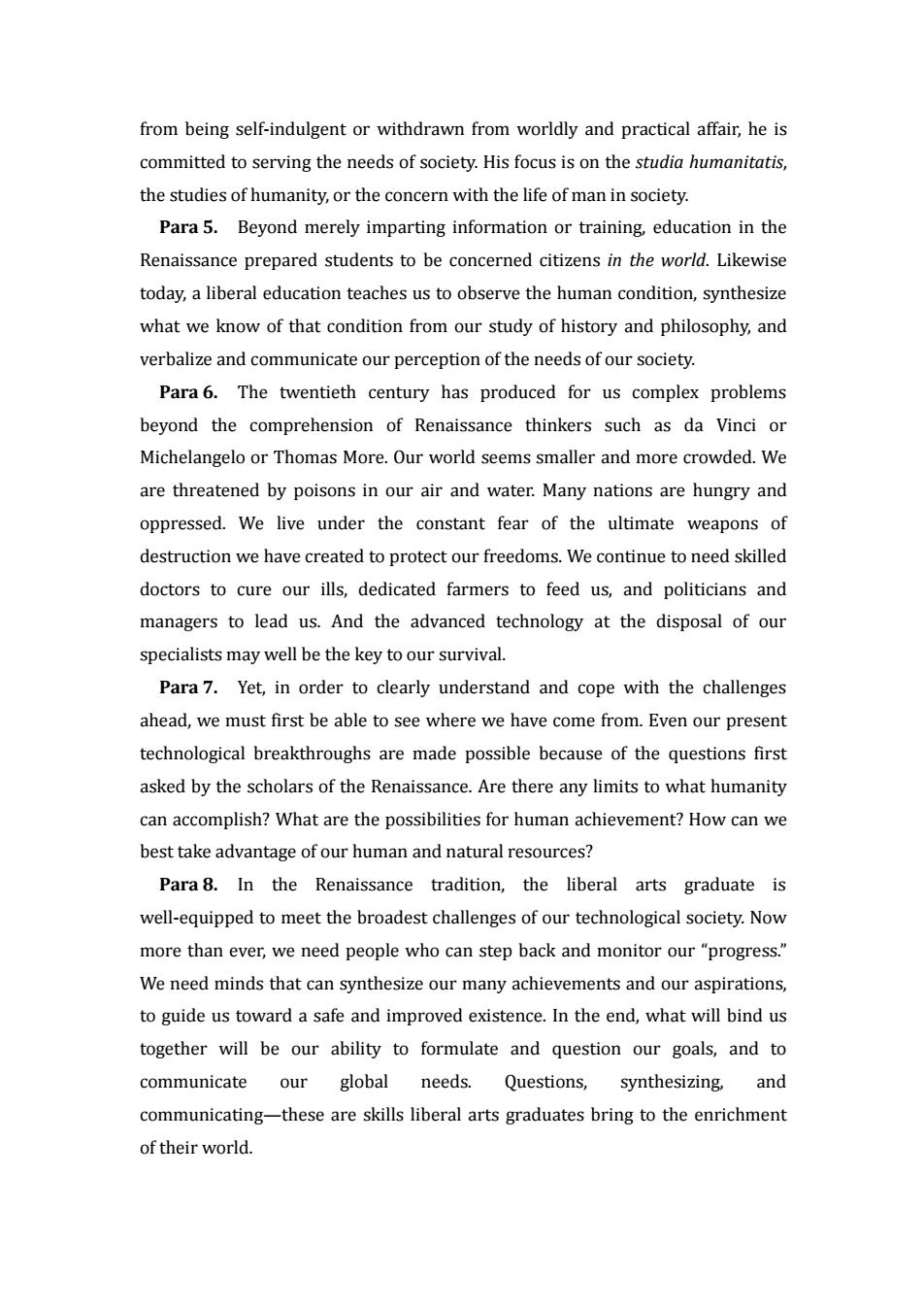正在加载图片...

from being self-indulgent or withdrawn from worldly and practical affair,he is committed to serving the needs of society.His focus is on the studia humanitatis, the studies of humanity,or the concern with the life of man in society. Para 5.Beyond merely imparting information or training,education in the Renaissance prepared students to be concerned citizens in the world.Likewise today,a liberal education teaches us to observe the human condition,synthesize what we know of that condition from our study of history and philosophy,and verbalize and communicate our perception of the needs of our society. Para 6.The twentieth century has produced for us complex problems beyond the comprehension of Renaissance thinkers such as da Vinci or Michelangelo or Thomas More.Our world seems smaller and more crowded.We are threatened by poisons in our air and water.Many nations are hungry and oppressed.We live under the constant fear of the ultimate weapons of destruction we have created to protect our freedoms.We continue to need skilled doctors to cure our ills,dedicated farmers to feed us,and politicians and managers to lead us.And the advanced technology at the disposal of our specialists may well be the key to our survival. Para 7.Yet,in order to clearly understand and cope with the challenges ahead,we must first be able to see where we have come from.Even our present technological breakthroughs are made possible because of the questions first asked by the scholars of the Renaissance.Are there any limits to what humanity can accomplish?What are the possibilities for human achievement?How can we best take advantage of our human and natural resources? Para 8.In the Renaissance tradition,the liberal arts graduate is well-equipped to meet the broadest challenges of our technological society.Now more than ever,we need people who can step back and monitor our "progress." We need minds that can synthesize our many achievements and our aspirations, to guide us toward a safe and improved existence.In the end,what will bind us together will be our ability to formulate and question our goals,and to communicate our global needs. Questions,synthesizing, and communicating-these are skills liberal arts graduates bring to the enrichment of their world.from being self-indulgent or withdrawn from worldly and practical affair, he is committed to serving the needs of society. His focus is on the studia humanitatis, the studies of humanity, or the concern with the life of man in society. Para 5. Beyond merely imparting information or training, education in the Renaissance prepared students to be concerned citizens in the world. Likewise today, a liberal education teaches us to observe the human condition, synthesize what we know of that condition from our study of history and philosophy, and verbalize and communicate our perception of the needs of our society. Para 6. The twentieth century has produced for us complex problems beyond the comprehension of Renaissance thinkers such as da Vinci or Michelangelo or Thomas More. Our world seems smaller and more crowded. We are threatened by poisons in our air and water. Many nations are hungry and oppressed. We live under the constant fear of the ultimate weapons of destruction we have created to protect our freedoms. We continue to need skilled doctors to cure our ills, dedicated farmers to feed us, and politicians and managers to lead us. And the advanced technology at the disposal of our specialists may well be the key to our survival. Para 7. Yet, in order to clearly understand and cope with the challenges ahead, we must first be able to see where we have come from. Even our present technological breakthroughs are made possible because of the questions first asked by the scholars of the Renaissance. Are there any limits to what humanity can accomplish? What are the possibilities for human achievement? How can we best take advantage of our human and natural resources? Para 8. In the Renaissance tradition, the liberal arts graduate is well-equipped to meet the broadest challenges of our technological society. Now more than ever, we need people who can step back and monitor our “progress.” We need minds that can synthesize our many achievements and our aspirations, to guide us toward a safe and improved existence. In the end, what will bind us together will be our ability to formulate and question our goals, and to communicate our global needs. Questions, synthesizing, and communicating—these are skills liberal arts graduates bring to the enrichment of their world